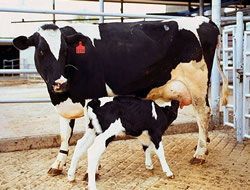This page has been archived and is being provided for reference purposes only. The page is no longer being updated, and therefore, links on the page may be invalid.
|
Cows Could Be Getting Too Much Protein
By Erin PeabodyNovember 23, 2004
It's not just consumers who are contemplating the effects of high-protein diets: dairy farmers are, too. Dairy cows need adequate protein for milk production, so farmers need to supplement their animals' diets with extra protein.
But an Agricultural Research Service scientist has found that while a certain amount of dietary protein is necessary for lactating dairy cows, too much can contribute to nitrogen pollution and, in some cases, decreased milk yield.
Dairy scientist Glen A. Broderick, with the agency's U.S. Dairy Forage Research Center in Madison, Wis., found that the optimal percentage of protein in the diet—which minimizes urinary nitrogen excretion without reducing milk production—is 16.5 percent. This is compared to the 18 to 19 percent often provided by many in the industry.
To meet the protein requirement, Broderick fed lactating cows a diet of alfalfa silage, corn silage and high-moisture corn, plus soybean meal as the main protein supplement.
A dairy cow has numerous microorganisms at work in its rumen, one of the animal's four stomach compartments. Many of these bacteria convert crude protein in the diet into a form that's well-balanced in amino acids for cows. But the bacteria will also degrade good-quality protein, leading to an overall net loss. Farmers compensate for the loss by feeding their cows high levels of protein supplement. But these higher-quality protein meals add to feed costs.
The extra protein isn't always utilized by the cow, so the animal excretes it as urinary nitrogen. In many farm settings, this very unstable form of nitrogen will be converted to ammonia, which turns into a vapor. Ammonia that's released into the atmosphere in this way can form acid rain, return to the Earth and fuel unwanted plant growth. Large amounts of nitrogen lost from concentrated dairy operations also have the potential to contaminate surface and ground waters.
According to Broderick, if just 1 percent less dietary protein were fed to dairy cows in the United States, urinary nitrogen could be reduced by about 60,000 tons per year.
ARS is the U.S. Department of Agriculture's chief scientific research agency.

